What is Accounting ERP? Benefits, Features, and Why It Matters for Qatar Businesses in 2025
Introduction: Why Qatar Needs Smarter Financial Systems Now
In 2025, Qatar and Qatar businesses are doing business in a high-regulation, high-growth world. You’re
either a mid-tier trading firm in Doha or a multi-site manufacturing plant in Sharjah. Whatever you are, the one thing you can’t get wrong is the financial backbone.
That’s where Accounting ERP systems enter the picture. But what is Accounting ERP, exactly? How does it
differ from standard accounting software? And why is this becoming non-negotiable for GCC companies?
This blog lays it out, practically, not theoretically. Whether you’re a CFO, finance manager, or business owner considering your tech setup, we’ll disassemble what’s most important to your operations, compliance requirements, and long-term growth.
What is an Accounting ERP System, And How Is It Different from Basic Accounting Software?
Let’s keep it simple.
ERP is an acronym for Enterprise Resource Planning. It’s a software system that assists businesses with
major business activities, such as inventory, sales, procurement, HR, and most importantly, finance, all within a single integrated system.
And when we mention Accounting ERP, we mean ERP software with a robust, centralised financial management
module that does much more than simply record transactions. As opposed to standalone accounting systems
(such as QuickBooks or Tally), an Accounting ERP:
- Integrates finance into operations (supply chain, payroll, inventory)
- Automates VAT, ESR, and Corporate Tax compliance and regulatory reporting
- Provides multi-entity, multi-currency, and multi-branch financials
- Triggers improved financial planning with integrated forecasting tools
Qatar example: A Dubai-based trading company with operations in Oman and Qatar can consolidate books,
automate intra-company transactions, and have real-time cash visibility across all territories in one
platform.
Why Qatar Companies Are Replacing Legacy Accounting Software with ERP
The move to accounting ERP is not simply about modernisation, it is about responding to actual pressure
points Qatar companies are experiencing today:
1. Regulatory Complexity
With the advent of Corporate Tax, VAT submission requirements, and economic substance rules (ESR), the
standard accounting system just isn’t able to cope. Accounting ERP streamlines this compliance and
minimizes the risk of error.
2. Growing Multi-Entity Operations
Most Qatar companies are expanding, new licenses, new territories. ERP facilitates consolidating and
segmenting financials by company, location, and business lines.
3. Pressure on Cash Flow
Whether it’s because of supply chain delays or payment cycles, cash flow is constricted. Accounting ERPs
provide real-time cash flow forecasting and working capital information to enable CFOs and finance
managers to move at a faster pace.
4. Integration with Banking & Payment Systems
Accounting ERP solutions now integrate with Qatar-based banks, payroll providers, and e-invoicing
systems. That’s something Excel or old desktop software just can’t.
The Key Features Your Accounting ERP Must Include
If you’re shopping for a new system, don’t get sold on generic feature lists. Look for tools and modules
that solve real local challenges.
Here’s what matters most to Qatar businesses:
1. Built-in VAT & Corporate Tax Compliance
Ensure your ERP is GCC-ready with:
- Real-time VAT calculation and e-filing
- ESR and Transfer Pricing workflows
- Qatar Corporate Tax ready chart of accounts
- FTA-compliant invoice formats
2. Multi-Currency and Multi-Language Support
For AED, QAR, USD, and EUR companies, your ERP must be capable of handling real-time currency conversion, hedging, and dual-language financials for Arabic/English reporting.
3. Strong General Ledger
Flexible general ledger enables more grouping by cost centers, departments, and branches, critical for
financial reporting across multi-license operations in Qatar Free Zones or the mainland.
4. Real-Time Financial Dashboards
Don’t wait until the month-end to know cash flow. Contemporary ERPs have live dashboards monitoring
receivables, payables, bank reconciliations, and profit margins in real time.
5. Close Integration With Supply Chain and Procurement
Qatar procurement tends to be hectic. ERP tracks:
Approved vendors and terms of prices
Purchase requests versus actuals
Inventory costing versus financial effect
This means your finance team won’t be the last to learn of a missed shipment or surprise bill.
HostBooks ERP, GCC Localised ERP Platform
HostBooks is not merely another ERP player. It is a platform with GCC-specific compliance, financial
discipline, and automation in its DNA.
What distinguishes HostBooks ERP as a strategic choice for Qatar/Qatar enterprises:
- Complete FTA-compliant VAT and CT modules
- Arabic/English interfaces
- Cloud-based accessibility from many locations and devices
- Integrated accounting + inventory + payroll + reporting stack
- Pre-built audit trail and version tracking to satisfy regulatory oversight
HostBooks also provides modular pricing, so you won’t have to pay for features that you won’t be using.
Be in retailing, manufacturing, or professional services, whether it is your business model or not, the
ERP adjusts to your model, not vice versa.
Major Accounting ERP Features That Are Important in the Qatar and Qatar Environment
With a market as competitive and regulated as the Qatar and Qatar, not all ERP systems are created equal. Regional finance leaders are no longer seeking simply the fundamentals of bookkeeping; they need smart
platforms that interoperate heavily with taxation laws, regulatory norms, and business objectives of
growth.
The following are the key features that any accounting ERP solution must provide if it’s to make a
difference in the Qatar and Qatar environment:
Integrated VAT Compliance
VAT came into effect in Qatar in 2018 and in Qatar shortly thereafter. Any accounting ERP needs to
support VAT natively, including:
- Real-time VAT calculation
- Automatically generated FTA-compliant tax invoices
- SAF-T compatibility
- VAT return submission workflows
With regulations being modified more often, cloud-based ERP solutions such as HostBooks provide for
automatic modifications according to Qatar Federal Tax Authority regulations.
Localized Chart of Accounts
The majority of global ERP solutions come preinstalled with a standard chart of accounts under the U.S.
GAAP or IFRS. Qatar- and Qatar-based organizations require a general ledger framework that mirrors local accounting customs. A customized chart of accounts ensures:
- Simpler compliance with local audit standards
- Simplified reporting for zone-based operations (e.g., Free Zones vs
Mainland) - Accelerated month-end close with meaningful grouping
Multi-Currency and Multi-Entity Functionality
Qatar and Qatar-based companies tend to operate in multiple currencies, mainly AED, QAR, USD, and EUR.
Your ERP should be able to handle:
- Real-time currency conversion
- FX gain/loss adjustments
- Consolidated reporting for subsidiaries in other GCC countries
Multi-entity management is particularly important for diversified groups. HostBooks ERP, for instance,
provides a centralized dashboard to manage books of numerous business units, each having its own
financial rules, without compromising on control or transparency.
Automated Financial Reporting
One of the key pain areas for CFOs in the GCC is the man-hours spent in preparing compliant, consolidated reports for stakeholders. The ideal accounting ERP should provide:
- Auto-generation of P&L, trial balance, cash flow statements, and balance
sheets - Dashboard-based business intelligence for instant decision-making
- Reports for Free Zone authorities, Ministry of Economy, or banks
Qatar and Qatar companies who want to scale require these financial insights not only for compliance, but to compete.
Real-Time Inventory & Supply Chain Management
For product businesses, supply chain and inventory management aren’t only about logistics; they’re about
money. Your ERP must provide:
- Automated inventory valuation using FIFO/LIFO or weighted average
- Reorder notifications and forecasted demand
- Cash flow forecasting with supplier payment scheduling
All of these are particularly relevant for the retail, construction, automotive, and semi-government
sectors in the Gulf.
Payroll & HRMS Integrated
With the strict labor legislation and WPS (Wage Protection System) regulation in the Qatar and Qatar,
there is no longer any validity to maintaining finance and HR as isolated silos. Contemporary ERP
systems need to incorporate:
- Payroll calculation and WPS compliance payment processing
- End-of-service benefits and gratuity automation
- Integration with leave encashments and employee expense claims
This minimizes errors, saves time, and facilitates smooth audits.
How Accounting ERP Addresses Specific Business Challenges in Qatar & Qatar
Let’s shift away from features. What actual on-the-ground pain does an ERP truly address for CFOs,
finance managers, and SMEs operating in the region?
Tussling With Manual Spreadsheets
Most mid-sized businesses in Doha, Abu Dhabi, and Dubai still function through siloed spreadsheets,
although they may have an accounting system in place. However, as team size increases, as well as audit
complexity, this results in:
- Duplication of data manually
- Gaps in audit trails
- Limited visibility into financial well-being
An accounting ERP consolidates all financial information, making it possible to have clean audit trails
and improved decision-making. With real-time synchronization among invoicing, general ledger, banking,
and cash flow, you can bid farewell to Excel dependence forever.
Delayed Financial Reporting
Delayed reporting in the Gulf can translate to more than lost opportunities; it can translate to fines,
non-compliance, and investor distrust. ERPs assist by:
- Automating recurring entries and reconciliations
- Enabling scheduled or real-time report generation
- Providing due diligence access to granular data, VC pitches, or internal
audits
As with startups or family businesses seeking external capital, a solid ERP is frequently perceived as an indicator of financial maturity.
Inability to Scale Operations
Qatar and Qatar business expansion can be explosive, new branches, new countries, or even new lines of
business. An accounting ERP enables one to:
- Onboard new entities without having to revamp systems
- Centralize reporting across several business lines
- Ensure regulatory compliance across geographies
This flexibility is essential, especially in industries such as logistics, contracting, and
import/export, where scale becomes rapid.
Why Qatar & Qatar Companies Now Make Cloud-Based ERP Systems A Priority
It’s not solely about cost or ease. Cloud-based ERP systems provide basic benefits for regional
companies:
Improved Data Security & Redundancy
With built-in backups, access controls by role, and safe encryption, cloud ERPs provide assurance that
sensitive financial information stays safe, even against internal mistakes or cyber attacks.
Zero Upfront Infrastructure Costs
Classic (on-premise) ERP software necessitates:
- Dedicated servers
- Internal IT staff
- Large initial investment
Cloud ERP solutions dispense with this, presenting monthly or yearly subscription structures that grow
depending on usage. This is especially useful for SMEs in the Qatar Free Zones or new Qatari businesses
seeking to control cash flow stringently.
24/7 Access Across Devices
Financial teams can access them from anywhere, from the office, home, or on the move. Such ease of use isimportant in today’s hybrid work scenario and also supports cross-functional collaboration.
Quick Implementation
In contrast to premises ERP implementations, cloud ERP deployments typically take weeks, not months. This
translates to quicker go-lives, accelerated ROI, and reduced training burden.
Why HostBooks Accounting ERP is Perfect for Qatar & Qatar Businesses
As a government-approved accounting software provider and ERP specialist, HostBooks offers a platform
designed for financial visibility, regulatory compliance, and scale up growth in the GCC.
Here’s why:
- Localized VAT engine on FTA and Qatari tax model alignment
- Bank-grade security with automated backups and end-to-end encryption
- AI-enabled modules for intelligent forecasting, audit preparation, and
fraud detection - Mobile-optimized dashboards for CXOs, finance managers, and auditors
- Free zone features such as automatic ESR (Economic Substance Regulation)
tracking
Whether you’re a new startup in Dubai Internet City or a well-established business in Doha’s Industrial
Area, HostBooks provides you with a future-proof financial system that expands with your business
growth.
What to Check While Selecting an Accounting ERP in the Gulf
Before committing to an ERP investment, these are non-negotiables every Qatar and Qatar business should
require:
| Must-Have Capability | Why It Matters in Qatar & GCC |
|---|---|
| VAT Compliance Engine | Avoid FTA or QTA fines |
| Multi-Currency Support | Seamless cross-border operations |
| Bank Reconciliation Automation | Faster monthly closing |
| Scalable to Multiple Entities | Growth-ready for diversified groups |
| Payroll + WPS Module | Full labor law compliance |
| Real-Time Financial Reporting | Faster insights, investor readiness |
| Arabic Language Support (Optional) | For local staff and government interactions |
| Integration with Tally, Zoho, etc. | Easy migration or hybrid workflows |
Why Now Is the Right Time for ERP Modernization in Qatar
Accounting ERP is no longer a “nice to have” in Qatar and Qatar businesses; it’s a strategic imperative.
For SMEs, it instils discipline, cuts costs, and creates new avenues for growth.
For businesses, it minimizes compliance risk and enhances investor confidence.
For finance leaders, it provides the visibility required to drive cash flow, manage operations, and scale with certainty.
In the rapidly changing Gulf markets, lagging behind in finance systems can equate to missing out on funding, compliance, or even credibility. But an intelligent, properly implemented ERP platform like HostBooks not only addresses accounting, it drives transformation.
It is time to ask: Is your finance function prepared for what’s next?

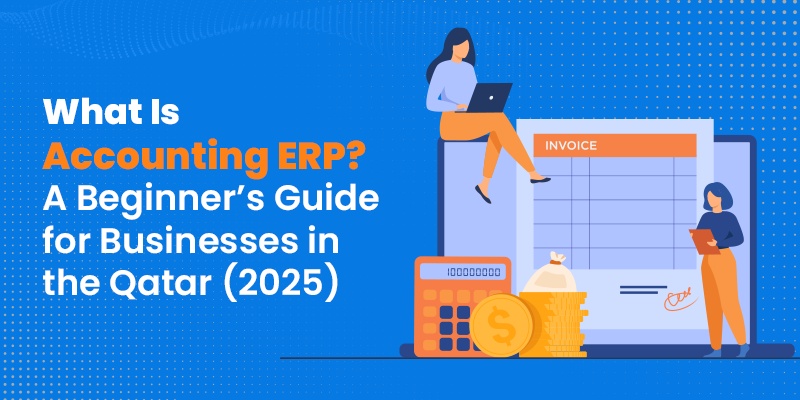
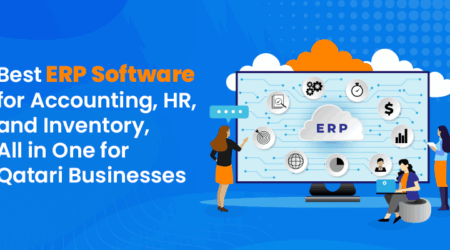

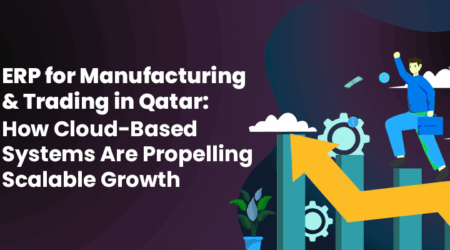
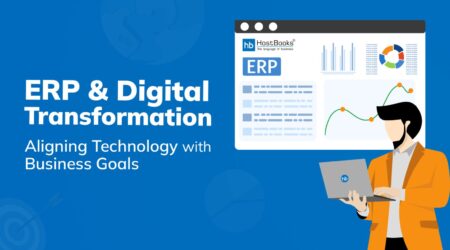
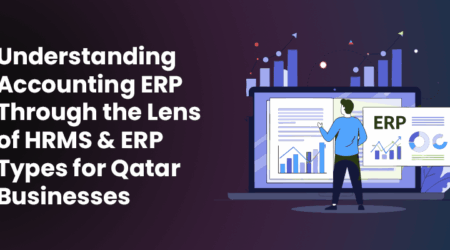
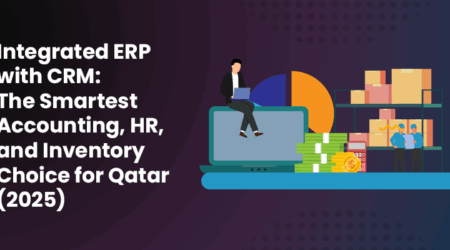
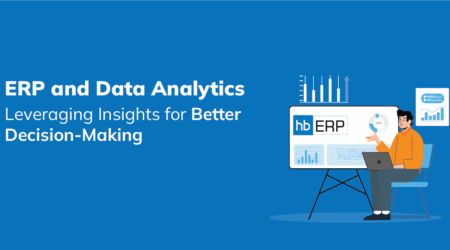
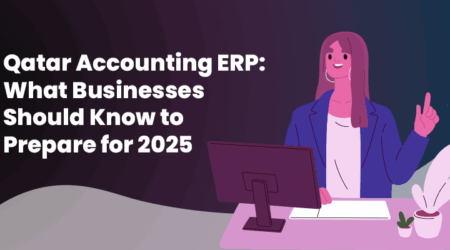

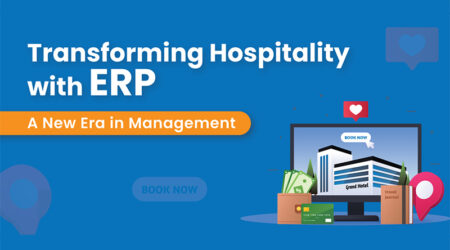
Leave a Reply